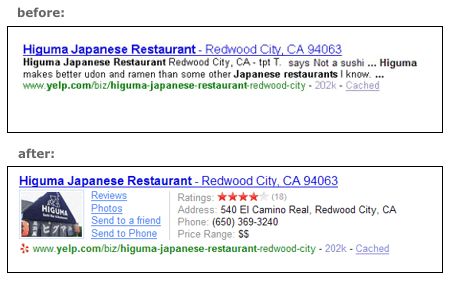Tuesday, February 26, 2008
Adding Meta-Data to Yahoo Search
Yahoo announced they will soon give websites the chance to offer more data about their site, in order to help Yahoo better structure how the site is listed in search results. Search Engine Land reports that users will be to subscribe to some of these special results, while others will be enabled by default. The following before/ after sample screenshots from the Yahoo blog illustrate the concept:

In the before screenshot, the result from Yelp.com includes only title, snippet, URL, and file size. In the richer result, there’s also a thumbnail photo, ratings, address, related links and more... which may improve this result, or make the result page more confusing to use due to clutter (and potentially skew results in favor of sites offering such meta data, as their listing becomes more visible even when it may not be more relevant). Yahoo thinks of this project, which they code-named “Search Monkey” – in homage to website-changing Firefox extension Greasemonkey –, as an open platform, saying users will benefit from better search results, and webmasters will benefit from higher traffic.
A big question I had after reading Yahoo’s announcement is where this meta-data is stored. If webmasters need to send the data to Yahoo via some API or web interface, then it would be stored on Yahoo servers, meaning webmasters would have to optimize their site just for Yahoo. If on the other hand Yahoo defines some kind of meta format that webmasters drop on their own server for Yahoo to crawl (along the lines of “example.com/meta.xml”... not unlike the joint Sitemaps initiative, or perhaps as extension to it), then other search engines like Google can access the same data. For webmasters, the latter approach would be far superior as they’d only have to define their meta-data once. It would also benefit more users, not just those of Yahoo, as soon as other search engines would start to support this meta format.
While Yahoo calls Search Monkey the “next generation” of search results, a similar feature has actually already been implemented in past generations of search: since May 2006, Google offers Subscribed Links as part of their Co-op initiative to let people subscribe to special search result widgets. Like with Search Monkey, some of the Google Co-op links (such as Google health results) are also rolled out to everyone by default. I don’t think Google’s subscribed links ever grew to be hugely successful – just look at the subscription numbers of the subscribed links directory – but maybe Yahoo will push their offering a bit more than Google did.
[Via Matt Cutts.]
>> More posts
Advertisement
This site unofficially covers Google™ and more with some rights reserved. Join our forum!
